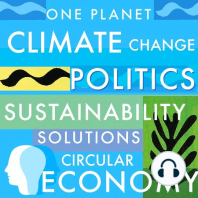20 min listen

Highlights - ARMOND COHEN - Executive Director of Clean Air Task Force
Highlights - ARMOND COHEN - Executive Director of Clean Air Task Force
ratings:
Length:
10 minutes
Released:
Mar 20, 2023
Format:
Podcast episode
Description
“The good thing about technology is it can move very fast. And so my advice would be if you're interested in this topic, if you have a mathematical, scientific, or business orientation, or you just like solving problems, you're that kind of person, get trained to really be part of the technological business revolution that's going on right now. Join up with companies that are doing clean energy work or work for an electric utility that's got the right commitment. If you're a policy person who doesn't like mucking around with numbers, then train yourself to understand the complexities of this and go into government or work in non-governmental organizations like mine and bring your brain to the table.If you look at universities' engineering programs, civil engineering, chemical, mechanical, and electrical, or you look at city planning departments around the world, and you open any catalog of any major university, within all those disciplines, there's going to be a major climate focus. It's like a unifying theme. So I'm seeing young people coming out of their training with a sense that their mission is within those areas, but there's no separating that in their minds from the need to control emissions on the planet and to get to a more livable climate. So, what I'm seeing is this massive amount of social energy and intellectual energy.”Armond Cohen is Executive Director of Clean Air Task Force, which he has led since its formation in 1996. In addition to leading CATF, Armond is directly involved in CATF research and advocacy on the topic of requirements to deeply decarbonize global energy systems. Prior to his work with CATF, Armond founded and led the Conservation Law Foundation’s Energy Project starting in 1983, focusing on energy efficiency, utility resource planning, and electric industry structure. Armond has published numerous articles on climate change, energy system transformation, and air pollution; he speaks, writes, and testifies frequently on these topics. He is a board member of the Nuclear Innovation Alliance and an honors graduate of Harvard Law School and Brown University.www.catf.uswww.creativeprocess.info www.oneplanetpodcast.orgIG www.instagram.com/creativeprocesspodcast
Released:
Mar 20, 2023
Format:
Podcast episode
Titles in the series (100)
(Highlights) ROB BILOTT: Interviewed by Mia Funk & Dayana Gonzalez · Associate Podcast Producer Dayana Gonzalez by Sustainability, Climate Change, Renewable Energy, Politics, Activism, Biodiversity, Carbon Footprint, Wildlife, Regenerative Agriculture, Circular Economy, Extinction, Net-Zero · One Planet Podcast